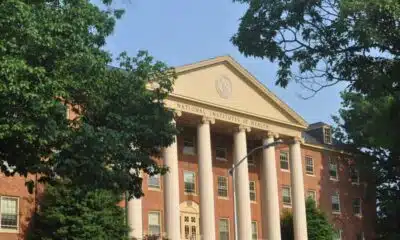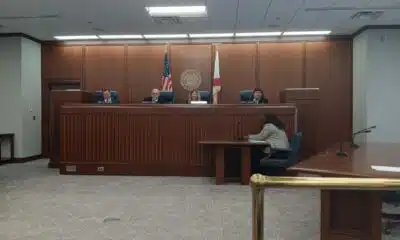News from the South - Alabama News Feed
Supreme Court permits Trump to use wartime law for deportations, for now and with limits
by Ariana Figueroa, Alabama Reflector
April 7, 2025
WASHINGTON — The U.S. Supreme Court Monday said the Trump administration could continue for now to use the Alien Enemies Act of 1798 to carry out rapid deportations of Venezuelans suspected of being gang members — but they must be given a chance to challenge their deportations in court.
The 5-4 decision, which lifted a temporary restraining order by a District of Columbia federal judge, will allow the Trump administration to deport Venezuelans 14 and older who are suspected of Tren de Aragua gang ties, in a victory for the administration of President Donald Trump.
But those immigrants who are subject to the wartime law must have “reasonable notice” in order to challenge their deportation in court “before such removal occurs,” according to the order. The question is which court.
The order argues that the venue of the U.S. District Court of the District of Columbia is wrong, and that the challenge, which was originally brought by five men in Texas, should be made in the Lone Star State. The challenge is no longer brought by five men and is now a class action.
“The detainees seek equitable relief against the implementation of the Proclamation and against their removal under the (Alien Enemies Act),” according to the Supreme Court. “They challenge the Government’s interpretation of the Act and assert that they do not fall within the category of removable alien enemies. But we do not reach those arguments.”
The president praised the decision, which did not address the merits of the actual law, on social media.
“The Supreme Court has upheld the Rule of Law in our Nation by allowing a President, whoever that may be, to be able to secure our Borders, and protect our families and our Country, itself,” Trump wrote. “A GREAT DAY FOR JUSTICE IN AMERICA!”
Dissenting justices
The three liberal justices dissented: Sonia Sotomayor, Elena Kagan and Ketanji Brown Jackson. The fourth dissent, in part, came from Amy Coney Barrett, who is considered a member of the court’s six-justice conservative majority.
“The Court’s legal conclusion is suspect,” Sotomayor wrote in her dissent.
She added that the majority opinion did not note the harm that could come to the Venezuelans who could face deportation under the Alien Enemies Act. Already, 238 men have been subject to the proclamation and are currently in a brutal mega-prison in El Salvador, the Terrorist Confinement Center or CECOT.
“It does so without mention of the grave harm Plaintiffs will face if they are erroneously removed to El Salvador or regard for the Government’s attempts to subvert the judicial process throughout this litigation,” she said. “Because the Court should not reward the Government’s efforts to erode the rule of law with discretionary equitable relief, I respectfully dissent.”
There is a preliminary injunction hearing against the Trump administration’s use of the Alien Enemies Act Tuesday at 3 p.m. Eastern before U.S. District Court Judge James E. Boasberg. That hearing deals with the administration’s use of the law.
This was the second decision from the high court Monday that sided with the Trump administration.
Earlier, Chief Justice John Roberts decided to temporarily pause a lower court’s order to require the Trump administration to return to the United States a Maryland man wrongly deported to a prison in El Salvador.
Appeal to the high court
The Trump administration March 28 appealed to the Supreme Court after an appeals court declined to do away with the temporary restraining order placed by Boasberg.
Boasberg had extended his temporary restraining order until April 12 to prevent any more deportations of Venezuelan nationals, invoked by Trump with a presidential proclamation on March 14.
The American Civil Liberties Union brought the suit against the Trump administration’s use of the wartime law. The legal organization asked the Supreme Court to keep the temporary restraining order in place because “it is becoming increasingly clear that many (perhaps most) of the men” who were on the March 15 deportation flights to the prison in El Salvador “were not actually members of” the Tren de Aragua and were “erroneously listed” due to their tattoos.
The same day that Boasberg issued his restraining order, on March 15, three deportation flights landed in El Salvador, where 261 men were taken to the mega-prison.
Boasberg has vowed to determine if the Trump administration violated his restraining order by asking for flight details but the Department of Justice has invoked the so-called “state secrets privilege” to block any information.
Last updated 7:31 p.m., Apr. 7, 2025
Alabama Reflector is part of States Newsroom, a nonprofit news network supported by grants and a coalition of donors as a 501c(3) public charity. Alabama Reflector maintains editorial independence. Contact Editor Brian Lyman for questions: info@alabamareflector.com.
The post Supreme Court permits Trump to use wartime law for deportations, for now and with limits appeared first on alabamareflector.com
News from the South - Alabama News Feed
Alabama PSC allows Alabama Power to purchase Autauga County power plant
by Ralph Chapoco, Alabama Reflector
August 5, 2025
The Alabama Public Service Commission Tuesday approved Alabama Power’s purchase of a natural gas power plant in Autauga County.
Commissioners also approved the company’s request to increase the monthly electricity rates it charges to its residential customers by $3.32 to offset the cost of acquiring the plant.
“After a review of all of the pre-filed testimony, the transcript of the hearing and the post hearing briefs in the form of proposed orders, the Staff has determined that Alabama Power Company has demonstrated a need for additional capacity and presented evidence demonstrating that the Lindsay Hill Facility proposed by the Company represents a reasonable means by which the Company can meet this need in a reliable and economic manner,” said John Garner, executive director of the Public Service Commission during the meeting.
GET THE MORNING HEADLINES.
The company said in a filing with the PSC in October that it needs roughly 1,200 megawatts in new power capacity by the end of the decade, due in part to the growth of data centers. The utility estimates that it will have surplus capacity until 2028.
This would be the third Alabama Power rate increase that the company imposed on its customers since 2020. The company acquired other power plants in 2020 and 2022 and increased the rate by $5 per month to pay for the cost of those purchases.
Alabama Power seeks to purchase natural gas plant in Autauga County
Alabama Power said in a statement on Tuesday that the decision reinforces the company’s commitment to deliver dependable energy to Alabama.
“Adding Lindsay Hill’s strong track record of reliable power to our generation mix will strengthen our ability to meet the growing needs of our state so we can economically produce the electricity our customers count on,” Alabama Power said. “Customers will not see any impact on their bills from this facility until mid-2027.”
Renewable energy advocates who intervened in the case and sought to block the purchase.
“Alabama Power’s five-year gas grab burdens families with higher bills and highlights the utility’s failure to consider cheaper and cleaner alternatives,” said Daniel Tait, executive director of Energy Alabama, in a statement.
“Alabama families deserve better than approving polluting power plants without proof they’re absolutely necessary,” said Jilisa Milton, director of Greater-Brimingham Alliance to Stop Pollution (GASP), in a statement.
Energy Alabama and GASP, represented by the Southern Environmental Law Center argue that Alabama Power overestimated the demand of these data centers when it estimated future capacity needs and excluded other energy sources that are more friendly to the environment from consideration
Alabama Power said it based its estimates on the power demand of a currently operational data center. It also said that it excluded renewable energy sources, such as solar power and energy storage, from its options because the company does not have the experience with those energy sources.
Independent Journalism for All
As a nonprofit newsroom, our articles are free for everyone to access. Readers like you make that possible. Can you help sustain our watchdog reporting today?
Alabama Reflector is part of States Newsroom, a nonprofit news network supported by grants and a coalition of donors as a 501c(3) public charity. Alabama Reflector maintains editorial independence. Contact Editor Brian Lyman for questions: info@alabamareflector.com.
The post Alabama PSC allows Alabama Power to purchase Autauga County power plant appeared first on alabamareflector.com
Note: The following A.I. based commentary is not part of the original article, reproduced above, but is offered in the hopes that it will promote greater media literacy and critical thinking, by making any potential bias more visible to the reader –Staff Editor.
Political Bias Rating: Center-Right
The article primarily presents factual reporting on the Alabama Public Service Commission’s approval of Alabama Power’s purchase of a natural gas power plant and rate increase. The framing largely reflects a pro-business and utility-friendly perspective, emphasizing the company’s need to meet growing power demands and maintain reliable service. While it includes critical voices from environmental groups who oppose the purchase and rate hike, their perspectives are presented as opposition statements rather than integrated analysis. Overall, the article maintains a tone that leans toward supporting traditional energy infrastructure and regulatory decisions favoring the utility, aligning it with a Center-Right bias.
News from the South - Alabama News Feed
Back-to-School Season in Alabama | Aug. 4, 2025 | News 19 at 6 p.m.
SUMMARY: Alabama schools are starting the new year with a focus on student health, attendance, and readiness. A new law banning phone use in schools is in effect, and educators emphasize the importance of consistent attendance to reduce chronic absenteeism. Greene County Superintendent Corey Jones reports about 900 students returning, with teachers prepared to support diverse needs, including nontraditional and homeless students. The Alabama Department of Public Health advises physicals for all students, especially athletes, to ensure proper growth and mental health. Governor Kay Ivey encourages students to be brave and strive for their best year yet, highlighting their potential to impact Alabama’s future.
Leaders across the state are sharing what students and parents need to know as the new school year kicks off.
News 19 is North Alabama’s News Leader! We are the CBS affiliate in North Alabama and the Tennessee Valley since November 28, 1963.
https://whnt.com/
https://www.facebook.com/whntnews19
https://www.instagram.com/whntnews19/
https://twitter.com/whnt
News from the South - Alabama News Feed
AGs from 15 states sue to block attacks on medically necessary care for transgender youth
by Ben Solis, Alabama Reflector
August 4, 2025
This story is a collaboration between Michigan Advance in collaboration with Wisconsin Examiner.
A coalition of 15 state attorneys general have filed a multistate lawsuit challenging the Trump administration’s effort to restrict access to medically-necessary care for transgender, intersex and nonbinary youth.
The lawsuit challenges recent federal action to deter doctors and medical providers from offering gender affirming care to youth under the age of 19 years old, including states like Michigan where that care is legal and protected.
Joining the suit are the attorneys general of Michigan, New York, California, Massachusetts, Illinois, and Connecticut, Delaware, Hawaii, Maine, Maryland, Nevada, New Jersey, New Mexico, Rhode Island, Wisconsin, and the District of Columbia, as well as Pennsylvania Gov. Josh Shapiro.
GET THE MORNING HEADLINES.
“The Trump administration shouldn’t be interfering with the provision of health care,” said Wisconsin Attorney General Josh Kaul in a statement Friday. “The administration should be respecting individual liberty and equal rights, not shamefully targeting transgender people.”
The attorneys general have asserted that President Donald Trump’s White House is overstepping its authority, using threats of criminal prosecution and federal investigations to pressure health care providers.
“The Trump Administration is attempting to strip away lawful, essential healthcare from vulnerable youth. These orders are illegal and dangerous and have no medical or scientific basis,” said Michigan Attorney General Dana Nessel in a statement. “I will continue to protect families, defend doctors, and stop politicians from putting our kids’ lives at risk.”
Trump in the beginning of his second administration signed an executive order stating that the U.S. would only recognize two sexes, and called for an end to what Trump labeled “gender ideology.” A second order focused on medical restrictions, directing the U.S. Department of Justice to pursue enforcement actions related to that care.
Since then, Nessel’s office said the Department of Justice has issued subpoenas to providers under the guise of criminal law enforcement, but the attorneys general filing the lawsuit Friday argue those efforts lack legal standing and are intended only to intimidate.
“Health care decisions for kids should be made by parents and doctors, not by politicians,” said Erin Knott, executive director of Equality Michigan, a LGBTQ+ advocacy group, in a statement. “The federal government is using funding as a weapon to force providers to abandon their patients and override parents’ rights to make health care decisions for their own children.”
Patricia Wells, a doctor and the medical director of The Corner Health Center in Ypsilanti, Michigan, said in a statement that she and her colleagues are distressed by new punitive changes to funding and regulations, which threaten to dismantle essential care.
“These policies do not protect children; they endanger them,” Wells said. “They undermine trust in the medical system and place affirming providers in an impossible position, forcing hospitals to close clinics and providers to stop offering the very care that helps young people survive and thrive. The loss of these services would not simply be a policy failure; it would be a moral one.”
Wells said the nation must do better.
“These young people deserve our compassion, our evidence-based care, and our unwavering commitment to their well-being,” she said. “I applaud the leadership of the state of Michigan for protecting transgender and gender nonconforming youth, their families, and the caregivers who are saving lives every day.”
Erik Gunn of Wisconsin Examiner contributed to this report.
Michigan Advance is part of States Newsroom, a nonprofit news network supported by grants and a coalition of donors as a 501c(3) public charity. Michigan Advance maintains editorial independence. Contact Editor Jon King for questions: info@michiganadvance.com.
Wisconsin Examiner is part of States Newsroom, a nonprofit news network supported by grants and a coalition of donors as a 501c(3) public charity. Wisconsin Examiner maintains editorial independence. Contact Editor Ruth Conniff for questions: info@wisconsinexaminer.com.
Independent Journalism for All
As a nonprofit newsroom, our articles are free for everyone to access. Readers like you make that possible. Can you help sustain our watchdog reporting today?
Alabama Reflector is part of States Newsroom, a nonprofit news network supported by grants and a coalition of donors as a 501c(3) public charity. Alabama Reflector maintains editorial independence. Contact Editor Brian Lyman for questions: info@alabamareflector.com.
The post AGs from 15 states sue to block attacks on medically necessary care for transgender youth appeared first on alabamareflector.com
Note: The following A.I. based commentary is not part of the original article, reproduced above, but is offered in the hopes that it will promote greater media literacy and critical thinking, by making any potential bias more visible to the reader –Staff Editor.
Political Bias Rating: Left-Leaning
This article clearly advocates for transgender rights and criticizes the Trump administration’s policies restricting gender-affirming care for youth. The language used is sympathetic toward transgender individuals and emphasizes medical and scientific consensus supporting such care. It highlights legal actions taken by Democratic attorneys general and frames the federal government’s enforcement efforts as overreach and intimidation. While the piece reports facts about the lawsuit and quotes officials and advocates, its framing and selection of sources indicate a perspective aligned with progressive values on LGBTQ+ rights and healthcare access.
-
News from the South - Texas News Feed5 days ago
Rural Texas uses THC for health and economy
-
News from the South - Texas News Feed7 days ago
Yelp names ‘Top 100 Sandwich Shops’ in the US, several Texas locations make the cut
-
Mississippi Today1 day ago
After 30 years in prison, Mississippi woman dies from cancer she says was preventable
-
News from the South - Kentucky News Feed6 days ago
Harrison County Doctor Sentenced for Unlawful Distribution of Controlled Substances
-
News from the South - Texas News Feed6 days ago
Released messages show Kerrville officials’ flood response
-
News from the South - Louisiana News Feed6 days ago
Residents along Vermilion River want cops to help prevent land loss
-
News from the South - West Virginia News Feed7 days ago
‘Good government’ group urges blue states to back away from a redistricting arms race
-
News from the South - Florida News Feed6 days ago
Officer shot, hospitalized after shooting near Busch Gardens











































